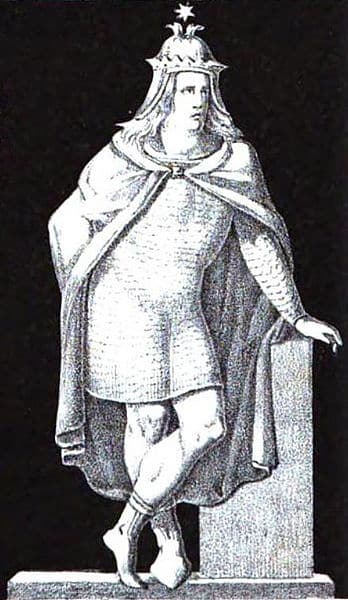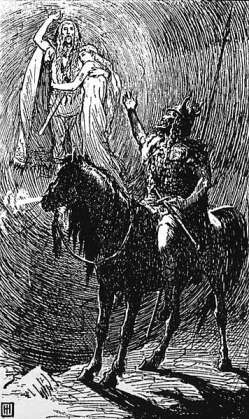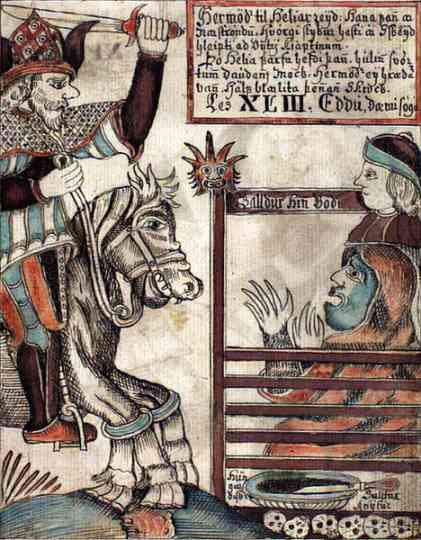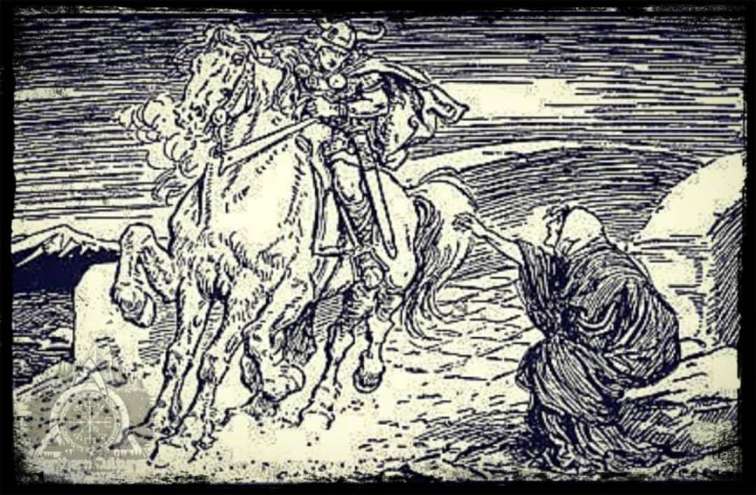Hermod (Old Norse Hermóðr) was the messenger of the Aesir gods in Norse mythology. A son of Odin and Frigg, Hermod was part of the main Norse gods. While mostly overshadowed by his more famous, and active siblings, he plays an important part in the story around the death of Baldur.
I believe that there were likely more stories in the Viking Age about Hermod, but they have been lost. In the vast expanse of the Nine realms, surely the gods would need a messenger more than once. Otherwise, there are several similarities with the god Hermes, the swift messenger of the ancient Greek gods worth exploring.
Hermod Key Facts
| Parents | Odin and Frigg |
| Partners | None known |
| Siblings | Thor, Balder, Vidar and others |
| Offspring | None known |
| Tribe | Aesir |
| Old Norse name | Hermóðr |
| Other names | Hermod the Swift |
| The God of | Messenger of the gods |
| Ass. Animal | Horse (specifically Sleipnir) |
Name and Etymology
The name “Hermod” in its original Old Norse form is “Hermóðr.” Delving into its etymology, the name is believed to be a composite of two elements: “herr,” meaning “army” or “warrior,” and “móðr,” which translates to “courage” or “spirit.” Thus, when combined, Hermod’s name can be interpreted as “warrior spirit” or “courage of the army.” This etymological insight provides a glimpse into the essence of his character, emphasizing bravery, swiftness, and a warrior-like spirit.
Kennings, which are poetic circumlocutions used in Old Norse poetry, aren’t abundantly associated with Hermod. However, the few that exist often allude to his role as a messenger or his swift journeys, emphasizing his primary function in the Norse pantheon.
Ancient origins
The concept of a divine messenger is a recurring motif in many ancient mythologies. Tracing back the origins of Hermod’s name and role, one can’t help but draw parallels with the Greek god Hermes. Hermes, much like Hermod, served as a messenger for the gods in Greek mythology. Their names even bear a phonetic resemblance, and their roles in their respective pantheons are strikingly similar. While Hermod’s specific characteristics and stories seem localized to the Norse tradition, the archetype of a divine messenger, as exemplified by both Hermod and Hermes, suggests a shared cultural understanding that transcends geographical boundaries.
Hermod’s Origins
Born to the mighty Odin, the Allfather, and Frigg, the queen of the Aesir, Hermod’s lineage is nothing short of illustrious. His family tree boasts of some of the most renowned figures in Norse mythology. Among his siblings are Thor, the god of thunder; Balder, the beloved god of light and purity; Váli, born for the sole purpose of avenging Balder; and Höðr, the blind god who inadvertently caused Balder’s death. There’s also Bragi, the god of poetry; and Vidar, the silent god known for his immense strength.

While all these familial ties are significant, Hermod’s bond with Balder stands out. After Balder’s tragic death, it was Hermod who bravely volunteered to journey to Hel, the land of the dead, to plead for his brother’s return. This act wasn’t just a duty, it likely showed a pride in doing his job, fulfilling the role as a messenger.
A Late Addition to the Pantheon?
While Snorri’s “Prose Edda” firmly establishes Hermod as a son of Odin, other ancient texts offer a different perspective. In the “Poetic Edda,” particularly in the “Hyndluljóð,” Hermod is mentioned alongside the human hero Sigmund. In this context, Odin bestows weapons and armor upon both Hermod and Sigmund, suggesting that Hermod might have been perceived as a human hero rather than a god.
This stark contrast between the two primary sources of Norse mythology raises intriguing questions about Hermod’s true nature and origins. Having said that, the Hyndluljóð does have a few odd references like that, which might point to regional differences, or a gap in its age.
Another, not unlikely possibility is that Hermod was a late addition to the Norse pantheon. Having been conjured up by Snorri. There is some evidence that seems to lean towards this theory. While Snorri’s writings have been invaluable in preserving Norse myths, it’s essential to approach them with a discerning eye, considering the potential influences and interpretations he might have introduced.
Given the discrepancies between the “Prose Edda” and the “Poetic Edda,” it’s plausible that Hermod’s divine status was an embellishment by Snorri, positioning him more as a deity than the human hero hinted at in earlier texts. Snorri did take quite a few large creative liberties in his writing, likely knowing nobody would ever challenge him on the finer details.
Hermod’s Family and Relationships
Hermod, unlike some of his siblings, doesn’t have many tales revolving around romantic relationships. His role as a messenger took precedence over personal entanglements. However, his bond with his family, especially his brother Balder, is of significant importance in the myths.
Children
There are no known offspring of Hermod mentioned in the Norse sagas or Eddas. This complete lack of other family, or deeper story really does make me think his whole being is a bit of an invetnion on Snorris’ part. However, in these situation I tend to lean towards having an open mind, as I believe we quite possibly have lost much more of the Old Norse stories than we will ever know.
Hermod’s Roles And Responsibilities
As the messenger of the gods, Hermod’s responsibilities were vast and varied. Tasked with conveying messages between gods and occasionally venturing to other realms, his swiftness and reliability were unparalleled. In a pantheon where communication between realms was crucial, Hermod’s role was indispensable. Whether it was messages of peace, war, love, or despair, Hermod ensured they reached their intended recipients promptly.
Beyond his duties as a messenger, Hermod also played a significant role in welcoming fallen warriors to Valhalla. In the “Hákonarmál,” a poem that describes the death of the king Hákon the Good and his reception in Valhalla, Hermod, alongside Bragi, is depicted greeting the fallen king and other warriors. This role further emphasizes his importance in the afterlife and the transition of souls, ensuring that brave warriors received the honor and welcome they deserved in the halls of the gods.
Among humans, Hermod was revered not just as a symbol of swift tidings but also as a beacon of hope. His journeys, especially the one to Hel to retrieve Balder, showcased his bravery and determination, making him a figure of inspiration for many.
Depiction And Characteristics

Hermod, in the sagas of Norse mythology, is typically portrayed as a beacon of youth and vitality. His youthful demeanor is not just a physical trait but also reflects his spirit, full of energy and determination. Quick on his feet, he embodies the essence of agility, making him the perfect messenger for the gods. His swiftness isn’t just about speed; it’s about his ability to navigate the intricate realms of the Norse cosmos with finesse and precision.
In the “Gylfaginning,” one of the primary sources of Norse myths, Hermod is referred to as “the nimble.” This epithet underscores his agility and the crucial role he played in conveying messages. His nimbleness wasn’t just physical; it also hinted at his ability to swiftly comprehend and relay intricate information, a trait indispensable for a divine messenger.
Furthermore, Hermod’s relationship with Odin, the Allfather, is of particular interest. He is often described as Odin’s “swain,” which can be interpreted as a servant boy or attendant. This title signifies a close bond of trust and loyalty between the two. Being in such proximity to the chief god, Hermod would have been privy to the inner workings of the divine realm, further emphasizing his importance.
More or less the only tale involving Hermod is one that shows his bravery, loyalty, and unwavering dedication to his duties. Riding Odin’s eight-legged horse, Sleipnir, he ventured into realms few dared to tread. This makes him simpler and less complex many of the other gods who had more developed characters.
Hermod’s Symbols, Artifacts or Animals
Hermod is closely associated with Sleipnir, the eight-legged horse gifted to Odin. This horse, known for its incredible speed, was Hermod’s primary means of transportation on his journey to Hel. Sleipnir’s origin is fascinating; born to Loki (in the guise of a mare) and the stallion Svaðilfari, this creature is a testament to the interconnected and often complicated tales of Norse mythology.
Play Fun Norse Quiz
Is this article making you even more curious about Norse gods and goddesses? You can satisfy your curiosity by playing a fun Norse mythology quiz. This way, you can test your knowledge about Norse gods and goddesses, as well as fill in some gaps. Good luck and have fun playing!
You might be interested in this fun game too! It reveals the parentage of Hermod and other sons (and daughters) of Odin:
Don’t forget to try our other games as well!
Myths about Hermod
Among all the stories of Norse mythology, Hermod’s presence is somewhat understated. While many gods show up again and again in of tales about their valor, love, or mischief, Hermod’s lore is primarily centered around a singular, poignant event. This again lends support to the argument that he is a figment of Snorris’ imagination which I have to agree. Regardless, this particular myth stands out, highlighting Hermod’s dedication and bravery.
Hermod’s Journey to Hel

After the heart-wrenching death of Balder, the gods were engulfed in sorrow. Amidst this sea of grief, Hermod, driven by familial love and a sense of duty, took it upon himself to journey to Hel. His mission? To negotiate for Balder’s release. Riding Sleipnir, Odin’s legendary eight-legged steed, Hermod braved the treacherous path to the land of the dead. For nine relentless nights, he navigated through dark valleys, his resolve never wavering.
Upon reaching the gates of Hel, he implored the realm’s ruler to release Balder. He presented the overwhelming grief of the gods as evidence of Balder’s significance. Hel, not unmoved by the plea, set forth a condition: Balder would be freed if every being, living or dead, shed tears for him. The world mourned, but one giantess’s refusal to weep ensured Balder’s continued stay in Hel.
Hermod and Ragnarok
When it comes to Ragnarok, the cataclysmic end of the Norse world, Hermod’s role is enigmatic. The sagas, rich with details about the fates of many gods, remain silent about Hermod. His part in this apocalyptic event is uncertain, leaving room for speculation and intrigue. While gods like Thor and Odin had destinies etched in stone, Hermod’s fate remains one of the enduring mysteries of Norse mythology.
Hermod vs. the Greek God Hermes
At first glance, Hermod and Hermes might seem like mirror images of each other, both serving as divine messengers in their respective pantheons. However, a deeper dive into their tales, characteristics, and roles reveals a tapestry of similarities and contrasts.
Role as Messengers
Hermod: In Norse mythology, Hermod’s primary role is that of a messenger. He’s the one the gods turn to when they need to convey crucial messages, especially those that require swiftness and discretion. His journey to Hel to negotiate for Balder’s release is a testament to his dedication and the trust the gods place in him.

Hermes: In Greek mythology, Hermes is not just a messenger but also the god of trade, thieves, and travelers. His winged sandals and caduceus symbolize his swift nature. He’s often seen guiding souls to the Underworld, showcasing a deeper connection to the realm of the dead than Hermod.
Birth and Lineage
Hermod: Born to Odin and Frigg, Hermod’s lineage is that of royalty. He shares this divine heritage with notable gods like Thor and Balder. His tales, though fewer, are deeply intertwined with the events of the Norse pantheon.
Hermes: Hermes is the son of Zeus, the king of the Greek gods, and Maia, one of the Pleiades. His birth story is filled with mischief and cunning. Legend has it that he stole Apollo’s cattle on the very day of his birth, showcasing his mischievous nature from the start.
Personality and Traits
Hermod: Hermod is characterized by his loyalty, bravery, and dedication. His tales, especially his journey to Hel, highlight his unwavering commitment to his family and the gods. He’s straightforward, with his tales lacking the cunning and trickery often associated with messenger gods.
Hermes: Hermes, on the other hand, is known for his wit, charm, and cunning. He’s a trickster god, often getting into and out of trouble with ease. His tales are filled with mischief, from deceiving the other gods to helping heroes with his clever schemes.
Symbols and Associations
Hermod: Hermod’s primary association is with Sleipnir, Odin’s eight-legged horse. This steed, known for its incredible speed, aids Hermod in his duties as a messenger, especially during his journey to Hel.
Hermes: Hermes has several symbols associated with him. The winged sandals and helmet signify his swiftness, while the caduceus, a staff entwined with two serpents, represents his role as a messenger and protector of merchants and thieves.
In conclusion, while Hermod and Hermes share the fundamental role of divine messengers, their personalities, tales, and associations paint different pictures. Hermod’s tales are marked by dedication and bravery, while Hermes’ stories are filled with wit, charm, and mischief. Both, however, hold unique and vital places in their respective mythologies.
Mentions in Ancient Texts
Gylfaginning (Prose Edda)
Written in the 13th century by Snorri Sturluson
Hermod’s most significant appearance is in the “Gylfaginning” section of the “Prose Edda.” Here, following Balder’s tragic demise, Frigg’s sorrow prompts her to seek a volunteer from the Aesir to journey to Hel, aiming to negotiate Balder’s release. Hermod, showcasing his unwavering dedication, takes on this perilous mission. Riding Odin’s steed, Sleipnir, he embarks on this quest:
“When the gods came to their senses, Frigg spoke and asked who there might be among the Aesir who desired to win all her love and good will by riding the way to Hel and trying to find Balder, and offering Hel a ransom if she would allow Balder to return home again to Asgard. But he is called Hermod, the Nimble, Odin’s swain, who undertook this journey. Odin’s steed, Sleipner, was led forth. Hermod mounted him and galloped away.”
Hákonarmál
Written in the 10th century by the skald Eyvindr skáldaspillir.
In the poem “Hákonarmál,” Odin summons both Hermod and Bragi to welcome King Haakon, a warrior who has met his end in battle and is now destined for Valhall:
“Hermóth and Bragi!” called out Hróptatýr
“Go ye to greet the hero; for a king cometh
who hath keenly foughten,
to our halls hither.”
Hyndluljod
Time of writing is uncertain, but it’s a relatively late composition by an unknown poet
In the “Hyndluljod” poem, Hermod’s portrayal takes an intriguing turn. Instead of being depicted as a god, he appears to be a mortal hero. In this narrative, he meets Odin alongside the hero Sigmund:
The favour of the Highfather we seek to find, To his followers gold he gladly gives; To Hermóðr he gave helm and mail-coat, And to Sigmund he gave a sword as a gift.
The varying timelines and interpretations of these texts provide a fascinating glimpse into Hermod’s character evolution and his role in Norse mythology.
I want to point out that Norse mythology was far from as uniform and simple in the actual Viking Age, across Scandinavia, as we often find it presented today. Some things we can say we know to be facts, but several things are open for interpretation. The story and role of Hermod might be just such a case.
Frequently Asked Questions
Hermod was the messenger of the Norse gods, responsible for conveying important messages between the realms.
He was the son of Odin and Frigg.
Yes, he’s closely linked with Sleipnir, the eight-legged horse.
The myths primarily focus on his role as a messenger and his bond with his family.
Balder was Hermod’s brother, and their bond is evident in the tale of Hermod’s journey to Hel.
The sagas don’t provide a detailed account of Hermod’s fate during Ragnarok.
Featured Image Credit: Ólafur Brynjúlfsson, Public domain, via Wikimedia Commons
